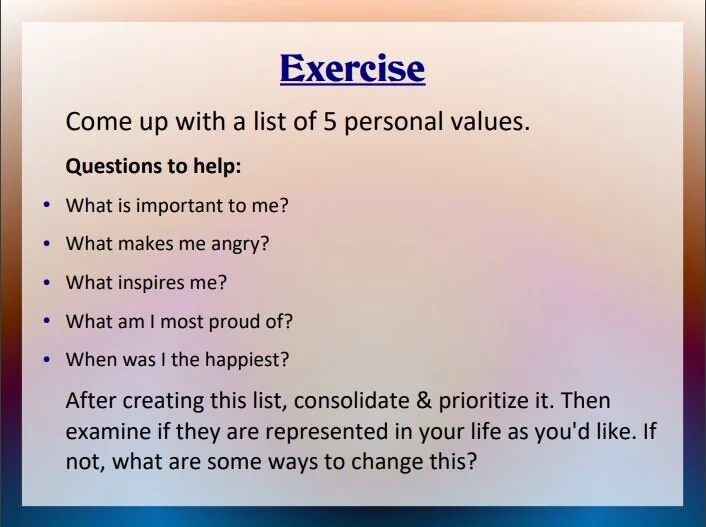In this exercise, we will work on defining and prioritizing our values. Understanding what is important to us and what drives us is crucial if we want to get to know ourselves better. Think about what makes you feel good. Does being kind make you feel good? Does adventure make you feel good? Does hard work make you feel good? What kinds of things are important to you? You can also explore not feeling good as a way to help understand your values: what makes you feel bad? If lying makes you feel bad, then you likely value honesty. If competition makes you anxious, then you likely value cooperation. If adventure makes you uncomfortable, maybe you value safety. If people shirking work makes you angry, you probably value responsibility. If ignorance bothers you, you probably value learning. If someone not keeping their word upsets you, then you must value integrity.
Everyone's values are different, and sometimes they are really different. There are no right or wrong answers here, just different things that are important to you.
After you've come up with your list of values (you may have less than 5 or many more), go down the list and search for any that are similar enough to be consolidated; “sincerity” and “truthfulness” can both be put under “honesty.” Then rank them according to how important they are to you, to your life and to your motivations. For example, achievement may be important to you, but it might not be as important as loyalty. So if you are offered a job that offers more money or a better position, loyalty to a current company that's been good to you may result in you not taking that job even though it promises more achievement.
After you've defined and prioritized these 5 values, you can examine them and evaluate whether they are reflected in your life. If there are areas where they are not (and this is really common), or if you'd like them to be represented better, come up with some goals that will help you achieve a life that better reflects your values. These can be big things or little things. It's up to you and what you feel is right. For example, if you have health as a top value, you can make it a goal to exercise more, lose weight, get better sleep and many other things. If you have honesty as a top value, you can make it a goal to speak your truth even when it is difficult or you worry how it will be received. In this way, we not only learn what our values are but how to implement them in our lives.
